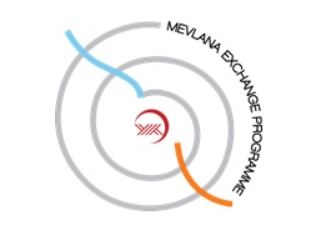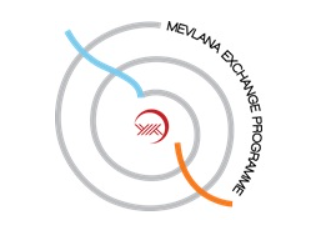
Mevlana Exchange Programme 
Mevlana Exchange Programme is a programme which aims the exchange of students and academic staff between the Turkish higher education institutions and higher education institutions of other countries. With the regulation published in August 23, 2011 (num: 28034), students and academic staff exchange between Turkish higher education institutions and higher education institutions of other countries has been possible. The programme includes all higher education institutions throughout the world without discriminating between the geographical borders. The higher education institutions of EU countries benefiting from Erasmus programme will not be included in Mevlana Exchange Programme in 2014-2015 academic year. Students may study abroad for one (minimum) or two (maximum) terms and academic staff may lecture abroad from one week (minimum) to three months (maximum). Accordingly, students and academic staff from any country may benefit from this programme being hosted by Turkish higher education institutions in order to study or lecture.
Mevlana
The original name of Mevlana, from whom the name of the programme is inspired, is Muhammed Celaleddin. Mevlana was born in 1207 in Belh of Horasan distinct that is now in the border of Afghanistan. The name “Mevlana” was used by Sultan Veled, §ems-i Tebrizi and his lovers, and virtually is a universal symbol which identifies with him. Also, he is known as Rumi by the western people. Mevlana lived in the 13th century, but as a sufi who got beyond the ages with his works, did not make any discrimination between people as indicated in his verse “Come, come whoever you are”. As well as his mercy, voluntary and unlimited humanity, he had endless tolerance and he impressed not only the world of Islam but also the whole humanity. He is accepted worldwide as an intellectual with his point of view to the people and life. UNESCO, due to the 800th anniversary of Mevlana’s birth, declared the year 2007 as Mevlana and Tolerance year. Throughout his education, he visited the educational institutions of various cities in different countries not only as a student but also a scholar. Mevlana attributed great importance to “change” in his philosophy throughout his lifeHe is also the author of the important works like Masnavi, Divan-i Kebir, Fihi Mafih, Mektubat and Mecalis-i Seba.
The Objectives of Mevlana Exchange Programme
The primary objective of Mevlana Exchange Programme is to exchange students and academic staff between the Turkish higher education institutions and higher education institutions of other countries. Additionally, Mevlana Exchange Programme aims;
- Making Turkey a centre of attraction in higher education area,
- Increasing the academic capacity of Turkish higher education institutions,
- Contributing to the globalization process of higher education,
- Sharing the historical and cultural heritage of Turkey in a global scale, Enriching the culture of respect and tolerance to differences by increasing intercultural interaction
Mevlana Student
Mevlana Exchange Programme Students,
- are willing to recognize and perceive their regions and the world better,
- are open to change,
- are qualified and self-confident,
- have a strong sense of competition,
- have global knowledge and responsibility.
The students, who benefited from Mevlana Exchange Programme, can also benefit from other exchange programmes before/after participating in this programme. The students, who participate in the programme after having the requirements, will be given non-refundable scholarship during their study abroad. The students do not pay any tuition fee to the host institutions during their exchange period.
Its Difference From Other Exchange Programmes
The current international and regional exchange programmes executed by some countries and regional organizations have limited contribution to the “globalization of higher education” approach of Turkish Higher Education Council. Students who apply to Mevlana Exchange Programme, a significant means of global higher education vision, will have the opportunity to study at a university they desire in any part of the world.
Additionally, all academic staff who work in a national or foreign higher education institution, on condition that the higher education institutions signed a bilateral Mevlana Exchange Protocol, may benefit from Mevlana Exchange Programme. This mobility includes educational activities to be performed in host institution.
The Benefits of Mevlana Exchange Programme to Students and Academic Staff
Mevlana students who have the opportunity to study abroad will be able to express themselves on the international level and will have both analytic and comparative point of view. The students who will study abroad thanks to this programme will have the chance to recognize cultures of their host countries in addition to the academic experience they will gain. These students, who make new friends and improve their foreign language proficiency, will have great advantage for achieving their career goals thanks to their international experience at their studies.
Academic staff, who will benefit from Mevlana Exchange Programme, will have the opportunity to do researches with new academic perspectives in addition to lecturing abroad. They can continue their cooperation by the mutual interaction via various conferences, projects and seminars after returning their home institutions.

